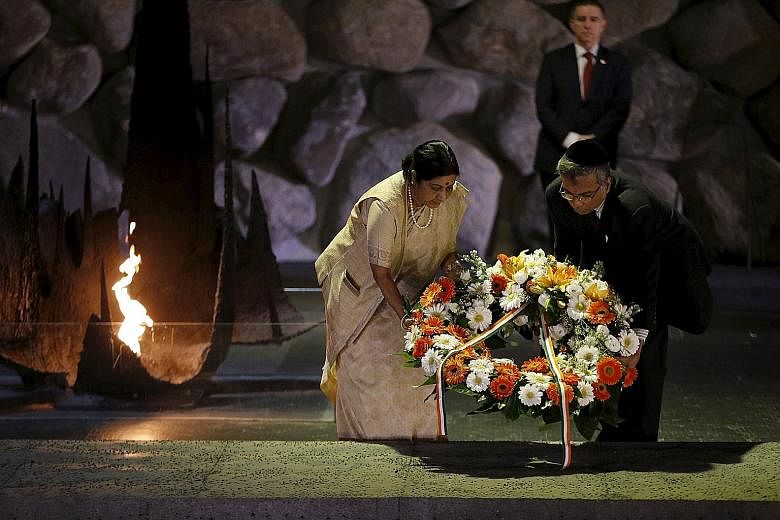India is looking to recalibrate its Middle East policy, taking into account the myriad changes afoot in the region.
New Delhi is seeking to deepen its defence engagement with Israel, while ramping up trade with Iran following the lifting of international sanctions against the country.
Indian External Affairs Minister Sushma Swaraj, who is currently on a visit to Palestine and Israel, said she hoped to "get an assessment of the situation in the region".
"India attaches the highest importance to the full development of bilateral ties with Israel," said Ms Swaraj, who met the Israeli leadership yesterday.
Last month, the Indian Navy successfully tested the Barak 8 surface-to-air missile, developed jointly by India and Israel.
On Sunday in Palestine, Ms Swaraj reiterated India's support for the Palestinian cause.
Her four-day visit to Israel and Palestine is seen as preparation for Indian Prime Minister Narendra Modi's visit there likely later in the year.
Also in the pipeline are prime ministerial visits to Saudi Arabia and Iran as India looks to re-energise ties with countries in the region.
The Modi government, which came to power on the promise of pushing economic growth and attracting foreign investment, has sought to ramp up India's engagement with the Middle East.
Over the years, India has built good ties with most leaders in that region, balancing ties with Palestine and Israel, apart from Sunni- majority Arab nations like Saudi Arabia, as well as Shi'ite-majority Iran.
Still, a visit by an Indian prime minister to the region has been rare until Mr Modi - who came to power in 2014 - travelled to the United Arab Emirates last year, in the first such visit in 34 years.
Ms Swaraj said recently that the Modi government had started focusing on the region and India would also receive some high-profile Middle East visitors in the coming months.
A boost in Indian engagement in the region comes when international sanctions against Iran are being lifted and after a recent breakdown in ties between Saudi Arabia and Iran - apart from the growing threat of the Islamic State in Iraq and Syria (ISIS) militant group in the region and beyond.
Syria last week revealed that it had taken into custody four Indians who were planning to join ISIS.
"There is not a major change in India's policy, but there is a tilt towards a new paradigm that is emerging in Iran and Syria," said Professor Zikrur Rahman, a former Indian diplomat who served for three decades in the Middle East.
"We are going to have an increased relationship with Iran, which was disrupted because of the sanctions. We will continue to deepen our engagement with Israel."
Mr Modi's engagement with the region is also seen to be driven by hopes of greater investment in infrastructure from countries like Saudi Arabia and the UAE, as well as in defence manufacturing from Israel.
"There will be strategic dimensions (in ties with the region) because of ISIS, which is an existential threat to people," said Professor P. R. Kumaraswamy at Jawaharlal Nehru University.
"But in the Middle East, the substance will be economic. It's not going to be political."
In another development, Pakistani Prime Minister Nawaz Sharif is on a trip to Saudi Arabia and Iran this week to try to ease the tension between the two countries.

